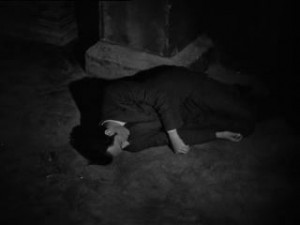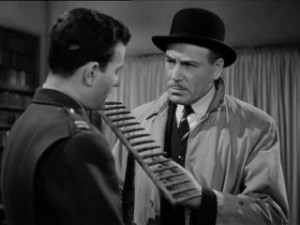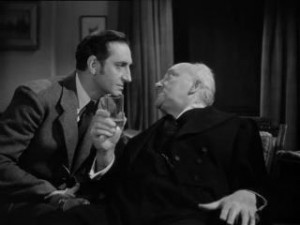Holmes promptly crumbles to the floor—thus the essence of the film’s title, though the detective has “faced death” before and will again: a slow bloodletting in Secret Weapon, hypnotized to walk off a terrace ledge in Woman in Green, carbon monoxide poisoning in Dressed to Kill, tied up behind a moving target in a carnival shooting gallery in Spider Woman, etc.—all of which he survives. The bullets in the gun are, of course, blanks, and witnesses to the killer’s confession step from the shadows—Watson, Lestrade and a policeman.
 Besides the gloomy, Victorian-style atmosphere which thankfully now replaces the WWII emphasis, and is so deliciously saturant in Faces Death, there continues Rathbone’s always wonderful portrayal of the enigmatic detective. The actor seems to maintain a consistency and believability throughout all the films, even when he was rumored to be tired of the character—the brisk, precise delivery; essentially unemotional in all things but respecter of goodness; that annoyed tolerance of Watson’s clock-regular silliness; a marginally controlled impatience, as when women (Sally here) tend toward hysteria; the reflection in his face of a probing and exacting mind. Of equal importance is that arresting Rathbone profile: the narrow, sharply etched face, the penetrating eyes, the slanting jaw and projecting chin, the tight lips, the hawk-like nose.
Besides the gloomy, Victorian-style atmosphere which thankfully now replaces the WWII emphasis, and is so deliciously saturant in Faces Death, there continues Rathbone’s always wonderful portrayal of the enigmatic detective. The actor seems to maintain a consistency and believability throughout all the films, even when he was rumored to be tired of the character—the brisk, precise delivery; essentially unemotional in all things but respecter of goodness; that annoyed tolerance of Watson’s clock-regular silliness; a marginally controlled impatience, as when women (Sally here) tend toward hysteria; the reflection in his face of a probing and exacting mind. Of equal importance is that arresting Rathbone profile: the narrow, sharply etched face, the penetrating eyes, the slanting jaw and projecting chin, the tight lips, the hawk-like nose.
One thing missing from Faces Death is one of the detective’s disguises, which may be as much a Holmesian trademark as the deerstalker hat or the Persian slipper where he keeps his tobacco. The disguises are important, both in the Doyle adventures and on screen. In the Universal and 20th Century-Fox films Holmes becomes a bookseller, an old priest, a surgeon, a music hall singer (perhaps Rathbone’s best impersonation), an old peddler and, in the same film, an aged postman and later the East Indian officer Raja Singh.
 As for the supporting players, many of them are sporadic regulars of the series. Just among the Universal films, there are Mary Gordon, Holmes’ indomitable landlady (with seven appearances), Dennis Hoey (6), Frederic Worlock (5), Harry Cording (5), Holmes Herbert (4), Harold de Becker (4), Gerald Hamer (4) and Hillary Brooke, Henry Daniell, Paul Cavanagh, Olaf Hytten, Gavin Muir and Ian Wolfe (3). The names in boldface, some already mentioned, appear in Faces Death.
As for the supporting players, many of them are sporadic regulars of the series. Just among the Universal films, there are Mary Gordon, Holmes’ indomitable landlady (with seven appearances), Dennis Hoey (6), Frederic Worlock (5), Harry Cording (5), Holmes Herbert (4), Harold de Becker (4), Gerald Hamer (4) and Hillary Brooke, Henry Daniell, Paul Cavanagh, Olaf Hytten, Gavin Muir and Ian Wolfe (3). The names in boldface, some already mentioned, appear in Faces Death.
And the music. Although “H. J. Salter” (Hans J. Salter) is listed as musical director, the actual composer of much of the score, Frank Skinner, goes uncredited. Skinner originally composed all new music for the first film in the Universal series, Sherlock Holmes and the Voice of Terror, and bits and pieces of this score would be distributed throughout the series, including, of course, Faces Death. Any stock music on hand would be inserted whenever necessary, much as Skinner’s Voice music would often be dispersed among other Universal films.
 The cue when Holmes and Watson prowl the Christopher dock in Voice is most evocative of mystery and suspense, appropriate to any number of Holmesian moments, with random harp plucks, fragments of music—three or four notes—passed from one woodwind to another, crescendos and tremolos and sul ponticello—a big bag of orchestral tricks. So a devotee of these films will recognize this cue whenever it reappears, including Faces Death during Watson’s nocturnal guarding of that cellar door.
The cue when Holmes and Watson prowl the Christopher dock in Voice is most evocative of mystery and suspense, appropriate to any number of Holmesian moments, with random harp plucks, fragments of music—three or four notes—passed from one woodwind to another, crescendos and tremolos and sul ponticello—a big bag of orchestral tricks. So a devotee of these films will recognize this cue whenever it reappears, including Faces Death during Watson’s nocturnal guarding of that cellar door.
The main title of Faces Death, with Holmes and Watson walking through a fog, is supported by Skinner’s motif for the detective and portentous chords accompanying the men’s footsteps. The main title visuals and music would remain the same throughout the entire twelve films.
Being made during the war, a patriotic end was felt needed. Doyle himself had been quoted in Voice of Terror, Shakespeare in Secret Weapon, Winston Churchill in Sherlock Holmes in Washington and The Scarlet Claw, but in Sherlock Holmes Faces Death it’s Millhauser’s own words. And he doesn’t do bad at all:
“There’s a new spirit abroad in the land,” Holmes intones. “The old days of grab and greed are on their way out. We’re beginning to think of what we owe the other fellow, not just what we’re compelled to give him. The time is coming, Watson, when we cannot fill our bellies in comfort while other folk go hungry, or sleep in warm beds while others shiver in the cold . . . while men anywhere are kneeling in either physical or spiritual subjection.”